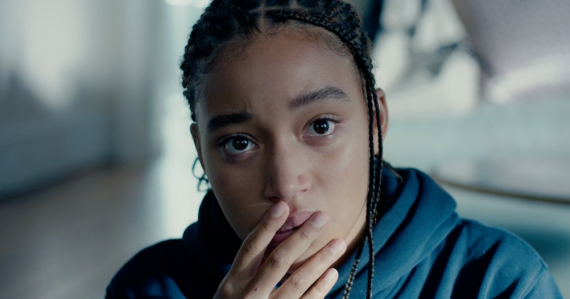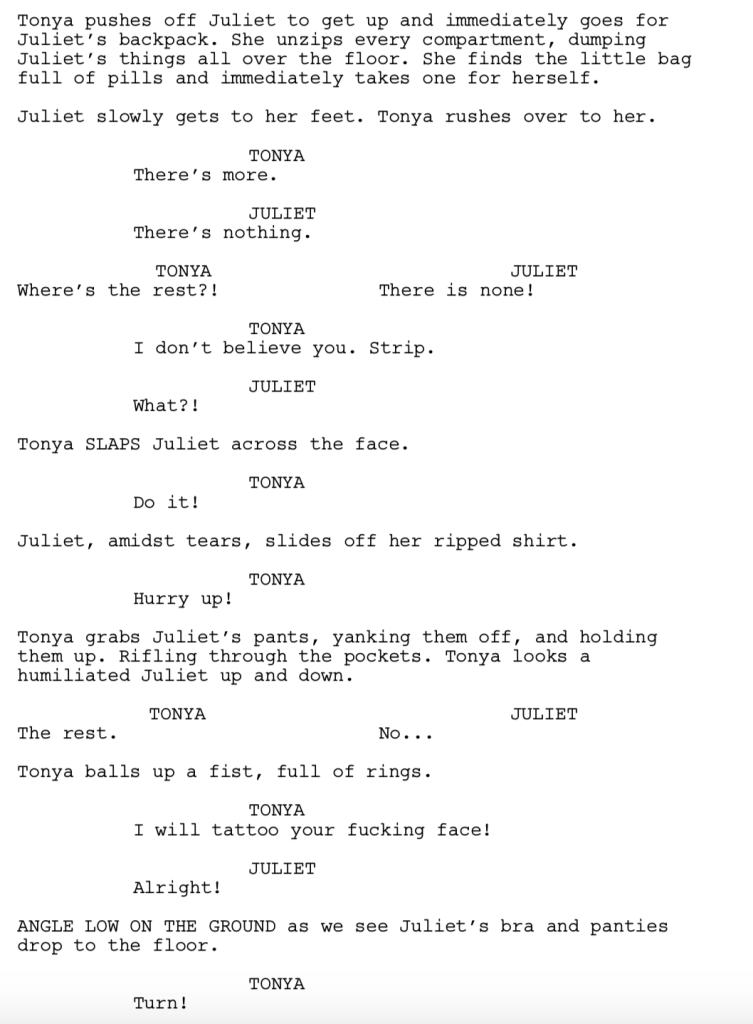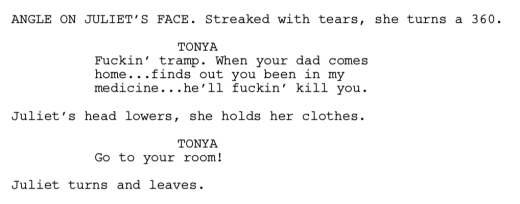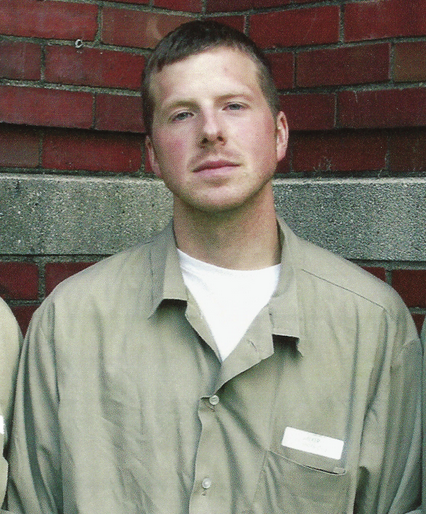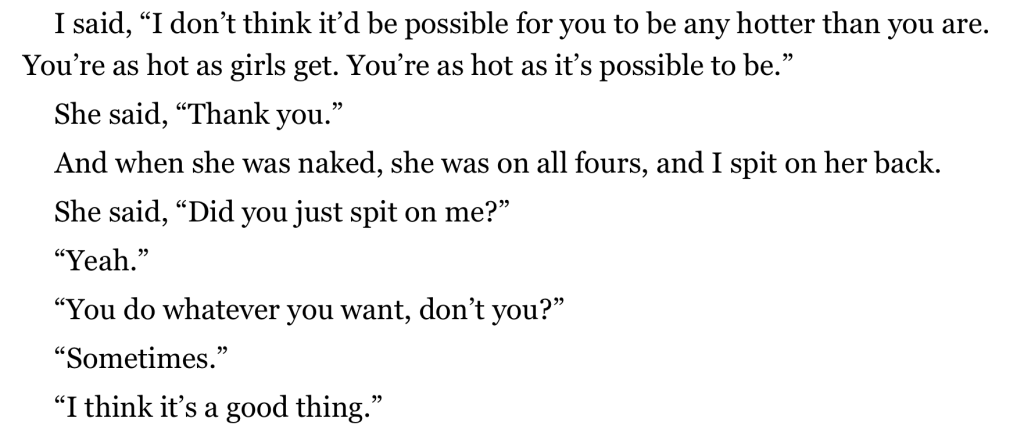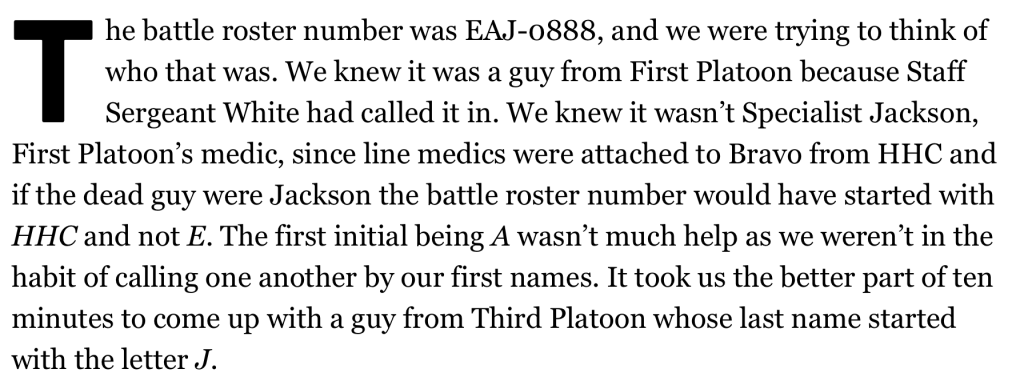It’s a wonderful and rare day here on Scriptshadow. We get to celebrate one of the very few IMPRESSIVE amateur scripts I’ve read for the site. Grab your popcorn and notepad. This should be fun!
Genre: Crime/Drama
Logline: A mob rib breaker turned high school janitor seeks to redeem his violent past by preventing a young girl from making the same mistakes he did, but when drugs and gangs overrun her school, he must risk his cover to clean it up.
Why You Should Read: Writing is the reason I get up in the morning. I have been a Nicholl Fellowship quarterfinalist multiple times, a Page semi-finalist and was the 2016 winner of Screamfest with my screenplay “Plum Island”. My day job working with troubled youths allows a consistent reservoir of unique experiences that I draw upon when creating realistic and fleshed out characters. Why read? “The Janitor” perfectly portrays human complexities in a gritty urban setting and creates cinematic characters that are both mythic and believable.
Writer: Matthew Lee Blackburn
Details: 113 pages
If you’ve been away from Scriptshadow for a few days, you missed that Friday I read a killer amateur script. It’s so rare that we get a great amateur screenplay, I didn’t want to rush a review out. I wanted to take my time, think about the script, then do it justice. Hence why you’re getting the review today.
The biggest surprise about The Janitor is that I’d almost given up on it by page 10. The script started out in a clunky manner, and since past experience tells me these scripts don’t get better as they go on, my mind began powering down. I was still going to read the script. But I wasn’t going to be 100% present.
And then something magical happened. We did a little time jump, began a new storyline, and introduced some of the most realistic characters and situations I’ve encountered in a screenplay all year. Another reminder that it’s possible to turn any reader around, no matter how tired or distracted they are, if you write a great script! Let’s take a look!
Despite his boss’s assumptions, Marty isn’t about to rejoin the criminal life that put him behind bars in the first place. Therefore, when he gets out, the first thing he does is steal a chunk of his boss’s money, buys a new identity, and disappears into rural America, where he eventually finds a janitorial job at Redimere Days, a high school that’s been racked by gangs and drugs.
After living with her grandmother for years, 14 year old Juliet Lloyd’s been sent back to her junkie mom and abusive stepdad’s house, where every day is an assault obstacle course. Her only escape is the 7 hours a day she spends at Redimere High. But as a new student who doesn’t know anyone, even that’s a rough experience.
So it’s nice when one of the popular kids, 18 year-old drug-dealer Mickey Kerr, takes an active interest in her. It’s clear to us that Kerr’s a no-good piece of shit. But with no positive life references, Juliet ends up trusting him. That trust nearly gets her raped by Kerr’s friends at a party. So the next day at school, Juliet beats the shit out of him in front of everyone.
The event puts her in line to be expelled, a decision Ruth, Juliet’s teacher and lone champion, begs the principal to reconsider. A compromise is made. Juliet can remain at school if she does a work study with the understaffed janitor, our friend Marty. Marty, the only person at this school who wants to be left alone more than Juliet, resists, but in the end, both must accept the arrangement.
You wouldn’t think that Juliet would enjoy cleaning toilets, but Marty is so kind, so helpful, that he quickly becomes the only person on the planet she can trust. When Marty learns that Juliet is getting beat up at home, he drives over to her house and frightens her stepdad so bad he pisses himself. Just as it’s looking up for Juliet and Marty, Marty’s old criminal gang finds out where he’s run off to. They show up in town with a simple goal: make Marty pay for ever thinking he could steal their money.
I’m sure a lot of you are asking the question: Why did Carson respond so well to this script as opposed to mine? What is this writer doing that I’m not? One of the things I’m constantly looking for in a screenplay is authenticity. Does what’s happening on the page feel like it represents real life? Or is it a facsimile of real life, a writer’s attempt to conjure up a reality he knows nothing about? 9 times out of 10, it’s the latter. Most writers are throwing characters and sequences on the page that are carbon copies of their favorite movies. They’re not digging into their own lives and giving us their own reality.
What I loved so much about The Janitor is that it feels like real life. For example, in a lot of screenplays, when there’s a kid who’s getting abused, writers will play it safe. Wherever there’s an abusive parent, they’re countered with a protective parent. That’s a very “movie-like” thing to do. You’re considering how the audience is going to respond. You’re considering the resistance producers might have to a 14 year old girl getting abused so intensely. So you wrap things in a buffer, a Hollywood safety net that lets everyone know: “It’s okay, everybody. This is just a movie.”
The Janitor doesn’t do that. The step-dad is an abusive lunatic. But the mom is just as bad. She doesn’t give a shit about Juliet. She’s high all the time. She screams at her nonstop. If the stepdad is swinging the bat, the mom’s placing the ball on the Tee. It was that setup that let me know, this world isn’t “Hollywood safe.” This is the real world, where sometimes people are placed in terrible situations where there are no lifeboats.
And Matthew, the writer, never shies away from this reality. There’s a scene in the script where the dad and Juliet are in his car and he’s mad at her and he just mashes her face into the window. It’s raw and unfiltered and real. And that’s what makes it resonate. But normally, I’d see this scene played safe. The stepdad might verbally abuse her instead. Or the violence might be off-screen. And I’m not saying there’s anything wrong with those choices. But the reason The Janitor works where so many other scripts don’t, is that it’s never afraid to be real. It’s not trying to hide anything.
A great side effect of authenticity is that it does wonders for your dialogue. If you’re mining the reality of a situation as opposed to making it up, characters talk more like real people. They’re more passionate, thoughtful, raw, unfiltered, genuine. And the great thing is, is that a lot of this dialogue writes itself. Remember, you only struggle to come up with words for your characters if you’re trying to artificially force words into their mouths. If you just let them speak, they’ll speak truthfully.
In this scene where Juliet’s mom accuses her of stealing her pills, you’ll see that there are no flourishes to anything anybody’s saying. It’s just one person wanting something and another person resisting. And when you have that, there are no long discussions. It’s a series of brutal clipped statements.
And this scene represents just how unflinching this script is. Juliet is living in a hellhole and we’re never given a break from that. We experience things as she experiences them. She gets attacked at school and needs to regroup? Tough cookies. She comes home and has to deal with her meth-head mom.
Now if you’ve been reading my site for awhile, you know the effect this has on the audience. Readers will always root for characters who are being harmed or taken advantage of. For that reason, we fall in love with Juliet immediately. We want to see her get out of this mess. It’s the driving force for why we must read til the end. To see that she escapes this hell on earth.
One of the tougher challenges with a script like this is finding a way to frame the plot. This isn’t a traditional goal-driven story. Sure, Juliet has to complete her work-study with Marty in order to remain at school, but that’s hardly a plot worth building a script around. So Matthew does something really clever. He creates this looming confrontation. We know that those guys from the beginning are coming back. You don’t get to steal a bag of money from a crime boss and not have to deal with it. So the fact that we know Marty’s going to have to fight off those guys at some point provides the script with a stealthy plot frame.
Remember, as long as we feel like we’re moving towards something big in a story, we’re engaged. GSU may be the easiest model to use. But it’s not the only model out there. It can be argued that The Janitor’s plot is a series of looming confrontations.
Speaking of the opening, that’s the only thing here Matthew has to fix. I noticed a few of you mention he should ditch the opening. But without the opening, we don’t have that looming threat anymore. So the opening needs to stay. But it has to be simpler. The problem is that a man we have no reference for is speaking in voice over. Three characters are introduced quickly afterwards. Everyone’s referring to backstory that we don’t understand. It’s no wonder we’re confused.
In these cases, I always tell the writer: What are the key pieces of information you’re trying to convey? Focus on those things and strip away everything else. All we need to know is that Marty just got out of prison, he used to work for these guys, he wants out, and he sees a way out with the money. Build a scene around that and strip away all the confusion.
But outside of that, I thought this script was spectacular. One of the best amateur scripts I’ve ever read on this site. It bumped right up against my Top 25, almost squeezing in. It very well may get there in the future. I’m going to be talking to Matthew tomorrow and I hope to help him take the next step in his writing career because he deserves it with this script.
Script link: The Janitor
[ ] What the hell did I just read?
[ ] wasn’t for me
[ ] worth the read
[x] impressive
[ ] genius
What I learned: The earlier in the script you are, the more hand-holding you have to do. The Janitor’s only slip up is this opening, where four characters we don’t know and who have a complicated backstory, are thrown at us in the middle of a murder. Something this complicated can’t be rushed through. You need to slow down and hold our hand more, walk us through it so we know what’s going on.
What I learned 2: You don’t have to hold our hand if you simplify the situation in the first place. I just want you guys to know that the simplifying option is always out there. If you’re having trouble explaining an intricate situation to the audience, such as this one, the solution might be to strip out the extraneous elements in order to make everything easier to explain.
What I learned 3: It’s important to note the marketing angle to this idea. The crime aspect. Without it, this is a straight drama, and therefore way more difficult to market. The crime angle makes this a movie as opposed to a screenplay.
Okay, so here’s the deal. I was exhausted when I started reading this. I almost stopped because I didn’t think I could give it a fair chance in the state I was in. I hated the opening. I was confused by what was going on. And then, out of nowhere, the script pulled me in. And it pulled me in DEEP. It’s too late for me to write out a review that honors a script this good. So I’m going to hold off my review until Monday.
In the meantime, I encourage everybody here to read the script. Not just so you can participate in Monday’s discussion. But so you know what a script that leaves an impression reads like. The character work here is – wow. The craziest thing is that I usually dislike scripts like this. So it’s going to be fun working out why this particular story succeeded with me where so many others failed. Feel free to leave initial comments on the script here. But please reserve your more substantial thoughts for Monday’s review. This script deserves a good discussion!
For those wondering what the script is like, I’d pitch it as A History of Violence meets Short Term 12.
Link to script: The Janitor
A handful of people e-mailed me after last week’s article stating it was one of the best screenwriting articles they’ve ever read. I also saw some comments from writers who felt I was oversimplifying the issue of screenwriting success (or lack thereof). Either way, the article struck a chord. And I think that’s because articles like that one force you to confront your bullshit. They ask you to be honest with yourself. And being honest with yourself is hard.
But it’s necessary if you want to succeed. Your struggles as a screenwriter don’t always come down to dialogue or pacing or character development. They can just as easily be due to the lies you tell yourself, to a corrupted belief system, to an inability to see yourself as you truly are. Failure is advertised as one of the most awful things a human being can be. So it’s no surprise we create excuses to protect ourselves from that label. That way, when we fail, we can blame the excuse instead of the person in the mirror.
For example, I’m trying to do some new things with Scriptshadow. However, I never have time to work on them. That’s what I tell myself anyway: “I don’t have enough time.” As I say this, I’m well aware that I spend 3 hours a day fucking around on the internet. Whenever I come home, I waste half-an-hour “getting myself into the work mindset.” And don’t get me started on how long it takes me to make and eat breakfast before the day starts. If I just had more time, I tell myself, I’d have these things done. The truth is, I have plenty of time. But it’s easier to blame the excuse than myself.
I’m bringing this up because yesterday, Avatar presented me with a question that plagues so many screenwriters: How do I get over the hump? I place well in contests. I’ve optioned a couple of screenplays. I won Amateur Offerings. Everyone who reads my stuff says they’re surprised I’m not professional yet. Still here I am, on the outside looking in. How do I get over the hump? This is a complex question because everybody’s situation is different. With that said, there are a few common reasons why screenwriters struggle to make that final push. Let’s go through them.
1) You haven’t dealt with your shit yet – I can’t help you get over the hump if you don’t have the courage to send your script to anyone. I can’t help you get over the hump if you start scripts but never finish them. I can’t help you get over the hump if you’re scared to face your weaknesses as a screenwriter. These problems are often psychological and can’t be fixed through writing. You need to talk to a professional and work through the real reasons you struggle with these issues. Once you tackle your personal issues, you’ll be ready for your screenwriting issues.
2) You’re not as ready as you think you are – This is the hardest reality to accept because everybody thinks they’re ready. No one wants to consider that they’re 1, 2, even 3 years away from success. But it’s a reality. If you’ve only written a couple of scripts or if you’ve only been writing for a short while? You’re not ready yet. And that’s okay. It means you’re only going to get better. But the point is, if you’re in your first three years of screenwriting, there is no reason to get upset that you haven’t made it yet. This skillset takes time.
3) Know where the odds are stacked – The fastest way to break into Hollywood is to direct your own script. Period. If you have any inclination to direct, I’m begging you to do so. The odds of your success are way higher if you’ve got a finished product to show than a stack of paper. If you don’t like directing, the next fastest way to break into Hollywood is with a cheap-to-shoot horror spec.
4) You’re trying to break in with the wrong script – This is one of the biggest mistakes I see amateur writers make. They’re trying to break in with a script that doesn’t fit into any known marketing template. An intense fictional drama. Or something semi-autobiographical. That’s not the script you break in with, guys. You break in with the horror specs, the thriller specs, the action specs, the true stories, the biopics. Once you sell one of those scripts and people know you, THEN you can pitch your extremely unmarketable script. I can’t stress how many writers make this mistake. Nobody cares about your passion project until you’re A-List. Even then they’ll beg you to do something else.
5) Promote the hell out of your script – You just spent 6 months writing a script. You deserve for it to be read! If you’re not blanketing every single avenue you know with that script, you won’t succeed. Period. If there’s one thing I can’t stand, it’s writers who send a script out to two people, get subpar reactions, then give up on it. This is a NUMBERS GAME guys. When you’re a nobody, numbers are all you’ve got. So if you’re not doing everything in your power to increase the number of people reading your script, success will be elusive.
6) Give it your all – You are competing against people who are willing to live in rat-infested apartments with 12 other tenants just to be closer to Hollywood. These people would sell their right arm to get their movie made. If you’re not all in, you’re probably not going to succeed. The competition is too stiff. Your free time needs to be spent either reading screenplays, writing screenplays, or studying screenwriting. Do yourself a favor. Download and read number 1 Black List script, Blonde Ambition. Not only is it a great screenplay. But pay attention to how every waking moment of Madonna’s life was dedicated towards breaking in. If you have that kind of attitude, I guarantee you you’ll succeed.
7) You don’t know what your weaknesses are so you can’t fix them – You can’t fix something if you don’t know it’s broken. People send me scripts all the time saying they’re “finally ready!” and they hope I’ll be able to “pass their script along.” Then I read the script and there’s an utter lack of clarity. The dialogue is on the nose. The characters are defined by their quirkiness rather than their flaws. The writer doesn’t know that the average scene is 2 pages long, not 10 pages. Yet these writers think they’re on the verge of breaking in. Come on man. Don’t be the writer who makes this mistake. Get tons of feedback, find out what your weaknesses are, then start fixing them.
8) Diversify – A lot of writers have this romantic notion that they’re going to sell a screenplay for six figures and that’s going to be their way in. Guys, it’s not 1993 anymore. Believe me, I wish it were. But the screenwriting game has changed and you need to change with it. That means looking for avenues BEYOND the spec sale. That means submitting for TV workshops at the studios. It means writing stuff for the web. It means making short films of your script. It means self-publishing a novel. A writer published a story a couple of weeks ago on The Daily Beast about the Monopoly Scam. Two days later, everyone in Hollywood was bidding for it. If you really want to break in, the front door is usually the hardest door to get through. If you walk around the house, you might find that one of the side windows is open. We just saw this with yesterday’s spec! Not a good script at all. But the writer sold it because she wrote a successful article in the New Yorker and A24 wanted to work with her on anything she had.
9) You haven’t written an awesome script yet – The number one reason you haven’t gotten over the hump is that you haven’t put it all together yet. It’s as simple as that. Write an awesome script and Hollywood will open their arms for you and pull you in for a big warm embrace. I’m not talking about an okay concept with a strong main character. Or a strong concept with an okay main character. Or a script with great dialogue but no story. Or a fun idea with with bland execution. You have to put it all together. The good concept. The strong characters. On-point plotting. Preferably a distinctive voice. It’s still the best way to get over the hump. This is why I advocate stacking the odds in your favor. Pick a marketable genre. Come up with a strong concept. Make sure the main character’s interesting enough to attract an actor. Be smart about it. Good luck.
Genre: Horror
Premise: A group of friends on a weekend getaway play a game of pretend murder called “bodies bodies bodies” which results in several real murders.
About: The hottest up-and-coming film company right now is A24. Now, typically, A24 follows a strict business model. Find an artsy director and let them direct whatever the hell they want. Don’t even look at the script. The script can be written in brail for all they care. This has resulted in a lot of beautiful looking movies (Hereditary, The Witch, A Ghost Story) with not-so-beautiful screenplays. Since A24 had to start thinking about the bottom line at some point, they’re evolving their approach to include buying and developing scripts. Which leads us to today. For the first time, A24 has purchased a screenplay without a director attached. This is that spec.
Writer: Kristin Roupenian
Details: 91 pages
You’re probably wondering how a newbie screenwriter was able to land the first spec purchase from the hottest indie company in Hollywood. It turns out Kristen Roupenian wrote a short story in The New Yorker called “Cat Person” that went viral. That success led to a publishing deal. And when A24 called to learn more about the author, she sent them bodies bodies bodies.
So, unfortunately, this isn’t the kind of sale we love to celebrate, the one where a writer toils away in obscurity for years, uploads a script to the internet, and all of a sudden there’s a massive studio bidding war. But let’s be honest. No story is ever like that. This sale represents the new normal for screenwriters – which is that you’re just as likely to break into the business due to some writing-adjacent success as you are from writing a spec screenplay.
I should point out that I knew nothing about this script when I opened it. I read it before I filled out any of the above information, including the logline. I loved the title. No idea what it meant but was intrigued. Could go in multiple directions. Let’s find out what this thing is all about, shall we?
Slutty Ashley, punky Bee, preppy Liz, hipster David, loudmouth Scott, wholesome Casey, and mysterious Matt, are visiting a remote cabin during winter for the weekend, looking for some 20-something level entertainment to enhance their endless partying.
After finishing a game of “Never Have I Ever,” Liz suggests a raucous game of “bodies bodies bodies.” Most of the crew have never heard of the game, so Liz explains it to them. While the rules are way too long for this summary, the basic idea is that two people are secretly given the title of “Murderer,” the lights are turned out, and everyone runs around trying to escape the murderers. If the “murderer” catches you, you “die,” and then everyone gathers around and, like a game of “Clue,” tries to figure out who did it.
Several chapters of the game are played before Casey finds herself all alone in the house. She announces she’s quitting, calls for everyone, but only Ashley and Bee turn up. Everyone else is gone. The three of them eventually head to the basement, where they find David, Scott, and Liz for-real dead. They freak out, run outside, only to realize it is so cold that they have to go back inside the house. Back inside where the killer is.
With several other horror tropes in play (no cell phone coverage, cars are blocked in), the three will have to figure out who killed their friend, a mystery complicated by the secret entrance of an unknown 8th player. And, oh yeah, let’s not forget that either Casey, Ashley, or Bee could be the killer as well. Bodies bodies bodies indeed.
Let me start by saying that there are a lot of “beginner screenwriter” mistakes here. For example, all the character names are capitalized throughout. You’re only supposed to capitalize names when they’re introduced. There’s a good reason for this. Capitalization signifies to the reader that a new character has entered the screenplay. So if the reader has, say, forgotten about a character, and then that character comes back later, and with a capitalized name, the reader may erroneously mistake them for a new character.
There’s also too much mundane detail in the action. For example, there’s a scene where everyone’s playing a card game, smoking a joint, and every other line is an exorbitantly detailed explanation of what the characters are doing with the joint. “MATT receives the joint from SCOTT, takes a hit, and then holds it between two fingers as he adds a card to the card house he is building out of the abandoned game of Kings. Once the card has been delicately placed, he considers his creation for a beat, then passes the joint to CASEY.”
A veteran screenwriter knows you don’t have to write any of this. The reader will fill in these unimportant details themselves.
Then there’s the explanation of the game. I don’t think I’ve ever read anything in a script that’s taken this long to explain. The rules are ENDLESS. And to make things worse, there are two halves to the game, one half for the night, the second half for the following day. Both are explained in endless detail, yet we never make it to the day. Which means that that entire section explaining the daytime rules was pointless! There were a lot of maddening mistakes like this.
Let’s get to the obvious question here: Does any of this matter? I mean, the writer sold the script, right? So these mistakes couldn’t have been that bad. That’s true. The mistakes didn’t hinder A24 from buying the script (even though it seems as if they were more keen on buying the writer than the script). However, if they send this script around to attach elements (producers, directors and actors) it matters a whole lot. The script feels so “beginner” in places that experienced parties are going to pass.
In the script’s defense, it gets better as it goes on. Once we got to the murdering, where our characters were in genuine peril, the script inherited some much needed energy that brought the story alive. The “Clue”-like mystery to the situation was also well done. (spoiler) One of my favorite parts was when they cornered Matt, convinced he was the killer, and killed him, only to learn afterwards that they were probably wrong.
What’s most interesting is A24’s decision to pick up the script in the first place. This doesn’t feel like anything they’ve done before. It’s got more of a Dimension or IFC Midnight vibe to it. I guess, because this was A24, I was looking for some offbeat indie twist. But this is popular moviemaking to the max. It should be noted that this pickup was meant to begin a new Chapter in A24’s life – development. So, conceivably, they’ll get some good people in there to guide the writer through some of these problems.
This felt very much like a writer trying their hand at screenwriting for the first time. For that reason, I could never get into it.
[ ] What the hell did I just read?
[x] wasn’t for me
[ ] worth the read
[ ] impressive
[ ] genius
What I learned: A common question writers have is: Do basic screenwriting mistakes really matter? A reader isn’t going to downgrade a good script because of some Screenwriting 101 mistake, is he? This is a complicated question but I’ll try and answer it in an uncomplicated way. There are usually several moments in a script where a reader will need to pause and process everything to make sure he understands what’s happening. For example, in Upgrade, the hero rolls into a bar and demands to talk to a character who I didn’t remember being mentioned, leaving me unclear as to who this person was and why the hero was asking for him. Now, if up to this point, the writing has been strong, I’m going to assume that my confusion is my fault. I must have missed an important detail somewhere. However, if the writing has been lazy or sloppy, with numerous beginner mistakes sprinkled in, I’m more likely to assume my confusion is the writer’s fault. This is how basic mistakes can do a writer in. Whenever the reader is unsure, they’re going to blame YOU, not themselves. In bodies bodies bodies, there are several elaborate conversations about who might’ve killed who in the fake game and how those clues may reveal who the real murderer is. These conversations were incredibly intricate and hard to follow. Because there were so many basic script errors leading up to these conversations, I assumed that my confusion had to be the writer’s fault, not my own. Had the script been cleaner and more professional, I would’ve assumed the opposite and gone back over the conversations to try and make sense of them.
The Russo Brothers loved this book so much they’re ditching superheroes for it. So what’s all the hype about??
Genre: War/Drama
Premise: A young man growing up in Cleveland decides to join the army, after which he suffers PTSD, leading to a string of bank robberies to feed his drug addiction.
About: Today’s book was a huge “out of nowhere” million dollar sale, highlighted by the fact that the author, who’s in prison for the crimes he writes about, couldn’t complete the sale for the movie rights because he ran out of his allotted prison phone minutes. He would need to wait a whole extra week to get it done. Meanwhile, the project became so hot that Avengers Infinity War directors Joe and Anthony Russo made Cherry their first post-Avengers directorial project.
Writer: Nico Walker
Details: 300 pages
I was cautiously excited to read this one. Excited because of the rags-to-riches backstory. Cautious because I know Hollywood gets so wet for these war books that they can’t see the forest through the trees. Case in point: Billy Lynn’s Long Halftime Walk. Hollywood LOOOOOVED that book. Couldn’t wait to turn it into a movie and win a billion awards. Except I read that book and it was easily one of the three worst books I’d read in my life. So I was hoping they hadn’t made the same mistake here.
The story follows the author, Nico, in 2003, as he attempts to figure out his life in Cleveland post high school, a life which seems to have no direction other than the love he has for his girlfriend, Emily. When finding a promising job proves difficult, Nico joins the army, and is shipped out for training soon after.
He’s eventually transferred to Iraq where he becomes a medic. His tour is one year, the majority of which is spent cleaning up human remains after IEDs blow up army vehicles. Nico quickly learns that this is war with all of the downsides and none of the glory. There are no soldier-on-soldier battles, just people getting blown up and shot in small skirmishes in the night, and the requisite clean-up afterwards.
Nico bides his time by thinking about Emily, calling her, e-mailing her, and seeing her during the few times he gets time off. Emily is not a fan of what Nico’s doing, and he soon begins to suspect she’s cheating on him. Since Emily is the only thing that keeps him going, he descends into a mental spiral of depression, knowing that if she is sleeping with other guys, there’s nothing he can do about it in Iraq.
When his tour is finally up, his worst fears are confirmed. Emily has been in numerous relationships while he was off in the army. The two break up, and Nico turns to booze and oxycotin, which eventually turns to oxycotin and heroin. He moves from woman to woman, but none of them make him happy the way Emily did.
Eventually, Emily reemerges and Nico gets her hooked on heroin. Every day is a hunt for the next score. When they run out of money, Nico has no choice but to start robbing banks so they can get their fix. When one of the banks publishes a camera shot that is as “clear as if I were sitting for an oil painting” Nico is arrested and sentenced to 11 years in prison. He won’t be released until 2023.
I can totally see why this author is getting attention. His style is raw, in your face, fearless. Most importantly, it’s truthful. One of the hardest things about writing yourself is that you’re always trying to come off as the good guy. Deep down you want people to like you – think you’re funny, cool, interesting, good. So you don’t write the bad things that you think or do. You’re afraid they’ll get in the way of the image you want to portray. The irony is that the bad parts are what make you human, and without them, you don’t seem real, you don’t seem flawed. The most powerful thing about this book is its lack of a filter.
The book also gives you something you can’t get anywhere else. And I think writers forget about this. They forget to ask, “What am I giving the reader that they can’t get with any other story, any other writer?” Because if you’re one of the 95% of writers who are rewriting movies we’ve already seen, why would I need to read your script? I’ve already seen it. Cherry gets extremely specific, especially when we’re in Iraq, and every page is filled with shit I never even thought about. I’m genuinely learning something new in every chapter. Here, after a dead body is called in, Nico and the rest of the crew try to figure out who it might be…
I’m not getting that kind of detail from the screenwriter who does his war research by renting Saving Private and Platoon.
Nico also wisely inserts an anchor into his story. When you’re writing one of these wandering narratives, it’s easy for the reader to feel lost. “Where is all of this headed?” is a common question. You allievaite this by adding an anchor, something to keep coming back to. This anchor grounds the story. The most common anchor used is a relationship. So, for Nico, it’s Emily. Whenever things start to get a little loose, we’ll call Emily, or we’ll e-mail Emily. They did the same thing in Forrest Gump with Jenny.
Nico even turbo-boosted this storyline because he inserted an element of dread into it. It wasn’t just, “Hey, it was nice to talk to Emily again!” There was an underlying sense that she wasn’t as committed to their relationship as he was. Maybe she had found someone else. Since we knew Emily was Nico’s world, we had to keep reading to find out if, indeed, Emily would leave him, or if it was going to be okay.
If the book has a weakness it’s that it’s too depressing. Depressing is fine if it’s earned. If, for example, Nico has this rosy outlook on life and then he experiences the carnage of war and it changes him – that makes sense. But Nico is a downer from the get-go. He’s never a happy guy. So there isn’t enough emotional variance throughout the book. We keep hitting that same “life sucks” beat over and over. Remember, guys – you need highs for the audience to be able to appreciate the lows, and vice versa.
As for the movie adaptation, I’m not sure how the Russos are going to approach it. The most interesting thing about the story is the bank robberies, but those robberies get the least amount of time in the story, as they’re mostly tacked on to the very end. They could focus on the war stuff, but I feel like we’ve seen a ton of Iraq war movies already. On the page this stuff sounds amazing. But I’m not sure it will look any different from the last mainstream Iraq flick. Or the one before that. Nico has such a pronounced voice that I fear this is one of those books that works best as a book, not a film. But we’ll see.
For those interested, this is a good companion piece to Hillbilly Elegy, a book that covers the same demographic, but through the prism of education rather than war. I’d say Elegy is better. But Cherry is still a solid piece of work.
[ ] What the hell did I just read?
[ ] wasn’t for me
[x] worth the read
[ ] impressive
[ ] genius
What I learned: Keep at it. Everything you write will be a struggle. Don’t give up. Nico wrote this book at the urging of a couple of guys working at a small publishing company. He didn’t think he could do it. He only wrote it because they believed in him. After three full years and dozens of rewrites, they gave the manuscript to one of the higher-ups at the company, and he said the writing wasn’t good enough to publish, and so Nico would have to rewrite the whole book over again and so he did. After they finished that version, one of the editors came in and made a few changes to the main character and Nico said, “What the fuck are you doing changing my story?” The editor said that when people read Nico’s version, they think the main character is a total asshole, but when they read this editor’s version, they think Nico is an asshole, but they kind of like him. So they went with the editor’s version.
What I learned 2: If you’re a really good structural writer who’s been told that your description, dialogue or characters are stiff, read this book. It really shows you what can happen if you just let go and write. It literally feels like the words are going straight from the writer’s brain to the page. There’s no, “I have to make this sentence perfect,” filter.


